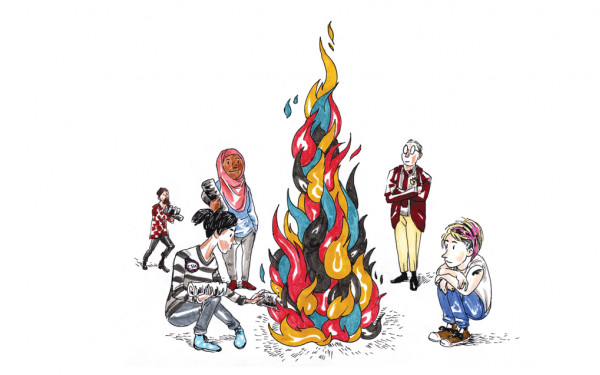Concordia Reviews Sexual Assault Policies to Strengthen Support for Survivors
Working Group Recommends Mandatory and Voluntary Training
Concordia University recommended new policies and procedures specifically for cases of sexual assault, including implementing use of the term “sexual violence” and voluntary training programs for certain groups like first-year residents, in a report released earlier today.
“I realized by late in the fall [of 2015] that I wanted to have a look at [Concordia’s sexual assault policy],” university President Alan Shepard said. “The report was drafted and given to me in early summer, and I took some time to think about it.”
The university will act on all of the recommendations, and a vast majority, if not all of them, are expected to be in place by the 2015-2016 school year, according to Shepard.
Previously, the university’s policy on sexual assault was listed under its sexual harassment code in a 34 page document for its code of rights and responsibilities. The new report, formulated by a policy review working group, recommends using the term “sexual violence” because it encompasses harassment and assault.
The report also recommends that education and training plans on rape culture and sexual violence be developed by the Sexual Assault Resource Centre (SARC) and the office of the Dean of Students.
The report lists specific groups to receive training, including senior administrators, student executives and athletes, athletic coaches, residence assistants, students living in residence and key faculty positions.
It further states that training could include mandatory and voluntary components. Lisa Ostiguy, the university’s deputy provost who led the working group from January to May, says they can reach more people by not making training mandatory.
Shepard says that they are seeking engagement and that the yearlong training will be “inescapable” for groups like students in residence. “It’s not legalistic appliance, it’s education,” Shepard said. “We’re good with education.”
Some groups, like resident assistants or student athletes, will have to undergo mandatory training, Ostiguy says.
“Student athletes are not targets and aren’t the only group on campus who need it, but they are leaders and ambassadors in our community,” she said.
Timing differs for each recommendation, Ostiguy says. For example, a new centralized web hub with links to all resources for victims has been added to Concordia’s website.
Listed under the Dean of Students page, it still takes a few clicks from the homepage to reach this new hub, but previously the content was scattered further and required the use of keywords in the search engine to find help.
On the other hand, another recommendation to increase the jurisdiction of the school’s Office of Rights and Responsibility to reach off-campus events will take longer, due to necessary procedural changes within the university’s existing governance structure, Ostiguy says.
The report also recommends to increase resources for the SARC. The centre only has one coordinator, Jennifer Drummond, as its full-time paid employee. All other staff are volunteers. More full-time hires are potentially being discussed as added resources, Shepard said, but nothing has been finalized.
SARC has switched from working under the university’s counselling and development sector to the Dean of Students Office. Finding a space where the centre can physically work alongside the Dean is still in the works, Ostiguy says. Currently, it is located in a small office space on the third floor of the GM building.
Last semester, a scandal within Concordia’s Arts and Science Federation of Associations brought local media attention to the university’s culture of sexual violence and its possible shortcomings in dealing with the issue.
Mei-Ling (a pseudonym to protect her anonymity) filed a complaint with Quebec’s Human Rights and Youth Rights Commission against two former colleagues on ASFA’s executive team, accusing them of sexual and racial harassment.
Since Mei-Ling went through the Dean of Students and the Office of Rights and Responsibility (ORR) for help, and they ultimately could do nothing, her legal representative Fo Niemi previously told The Link that the university is legally liable for negligence.
At this point, they have not formally pursued a complaint against the school, but they are still within the time period to do so, the executive director from the Centre for Research Action on Race Relations added.
Shepard declined to comment on the potential formal complaint, saying that the school won’t address anything dealing with potential litigation.
“The review that Lisa led showed that policies and practices were strong,” he said about the school possibly failing to protect or help past survivors. “They were not weak—could they be stronger—yes.”
The report’s seven person working group, which included staff, faculty and two undergraduate students, met with different Concordia constituents for consultation. These individuals notably included Drummond, Anaïs Cadieux Van Vliet from the Centre for Gender Advocacy, Howard Magonet from Counselling and Development and Louise Shiller from the ORR along with four others from different departments or faculty unions.
While the report mentions inclusivity for “marginalized groups,” direct consultation with groups or organizations representing Concordia’s ethnic communities did not occur, because of time constraints to finish by last semester’s end, Ostiguy said.
She added that places such as the Aboriginal Resource Centre was indirectly represented by Andrew Woodall, the Dean of Students who oversees the centre’s operations.
The report doesn’t offer recommendations to the school’s existing procedures dealing with perpetrators or the accusatory of sexual violence. Ostiguy said the focus for this report was on support for survivors.

_900_600_90.JPG)



_600_375_90_s_c1.jpg)
_600_375_90_s_c1.jpg)
_600_375_s_c1.png)